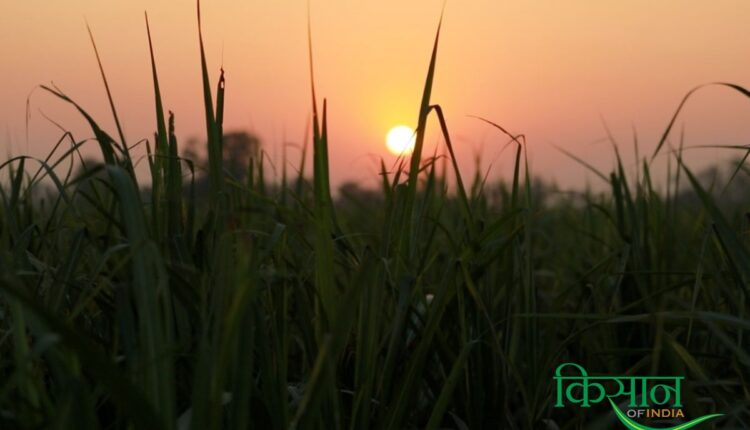Samman 2024: Towards Organic Farming: An Inspiring Farmer’s Journey
Towards Organic Farming: Today, we will talk about a farmer who not only changed his farming practices but also started a new revolution in his village. This is the story of a farmer who transitioned from chemical-based farming to organic farming and has now become an inspiration for his community by growing healthy and pure food for his family and setting an example for society. Manoj Kumar Singh from Haidergarh village in Barabanki, Uttar Pradesh, shared his journey in an exclusive interview with Kisan of India.
Transition from Chemical to Organic Farming
Manoj Kumar Singh began organic farming in 2019. Earlier, like most farmers, he too relied on chemical-based methods. However, a few years ago, his cousin, who had been practicing organic farming for 15-16 years, introduced him to its benefits. Although they had several discussions about it, Manoj initially didn’t grasp the concept fully.
One day, when he went to his cousin’s farm to get flowers and guava plants, his cousin explained, “If you consume pure food, your family will stay healthy and free from diseases. Start by growing vegetables organically for your own consumption.” This advice inspired him to take the first step toward organic farming.
The First Experience: Small Beginnings, Big Results
Manoj started with just one acre of land and initially focused on vegetable farming. He noticed that organically grown vegetables, especially potatoes, did not spoil even in the summer, unlike chemically grown ones, which decayed quickly. This experience made him realize the potential of organic farming, and he gradually expanded his operations.
Today, Manoj practices organic farming on six acres of land, growing crops like sugarcane, banana, guava, lemon, and Indian gooseberry (amla). Additionally, he cultivates pulses such as moong, masoor, and urad along with various vegetables. His farm also produces sugar and molasses from sugarcane. Wheat, chickpeas, maize, and rice are other staple crops he grows organically.
Technological Integration: A Blend of Traditional and Modern Approaches
Manoj is not behind in adopting new technologies. He collaborated with the Agricultural Science Center to utilize modern techniques. Today, he uses a straw bundling machine for proper management of agricultural waste. He also employs a portable spray pump and modern spray guns capable of covering a distance of up to 125 meters.
Considering the water shortage, he leveraged government schemes to install solar pumps in his fields, significantly reducing irrigation costs.
Cattle Rearing: The Backbone of Organic Farming
Currently, Manoj Kumar Singh owns five native breed cows. These cows not only provide him with pure milk but also contribute manure and urine, which are used to prepare organic fertilizers like Jeevamrit and Ghan Jeevamrit. This ensures that no chemical fertilizers or pesticides are used on his farm.
He said, “Our field has no trace of urea or chemical pesticides. We used only organic manure for three years to completely eliminate the chemical residues and improve soil quality.”
Costs and Profits: A Case of Profitable Farming
Initially, organic farming might seem costlier, but as soil fertility improves, the yield also increases over time. Manoj states, “We earn around 4 to 4.5 lakhs per acre annually. The main reason is that we produce as per our needs and sell the surplus directly to customers, avoiding market fluctuations.”
Manoj has successfully produced and sold green chilies, onions, potatoes, garlic, and other vegetables. By supplying directly to consumers, he not only ensures profitability but also maintains the quality of his produce.
Recognition and Honours
Due to his significant contribution to organic farming, he has received several awards and certificates. Organizations like ICAR and the Agricultural Science Center have honored him. Many farmers in his village are now inspired by his work and are taking steps toward organic farming.
He said, “Earlier, people thought organic farming wasn’t profitable. But now, they see that it not only ensures good returns but also improves soil health and provides healthier food.”
A Catalyst for Social Change
Today, Manoj Kumar Singh is a respected name in his area. Every product from his farm is certified, and people buy them with complete trust. His story teaches us that the seed of change can be sown anywhere—all it requires is the right knowledge, determination, and a bit of patience. Organic farming is not just beneficial for health but also protects the environment.
Benefits of Organic Farming:
- Soil Fertility: Organic farming uses natural fertilizers, ensuring long-term soil fertility.
- Healthy Produce: Organically grown crops are free from chemical residues, making them healthier.
- Environment-Friendly: Organic farming does not cause chemical pollution to soil, water, or air, making it environmentally sustainable.
- Cost-Effective: Organic waste can be converted into manure, reducing the need for expensive chemical fertilizers.
How to Adopt it?
To start with organic farming, farmers should first learn about organic fertilizers and pest management techniques. They can connect with local agricultural departments or Agricultural Science Centers for guidance. Several organizations also conduct training programs for farmers, teaching them organic farming methods and applications.
This story is not just about one farmer but symbolizes a change that can create a new wave of awareness in society. If we take a step toward organic farming today, we can not only keep our families healthy and safe but also lay a strong foundation for a clean and prosperous future for the generations to come.
Let’s join this revolution of organic farming and take a step towards a healthier India!
Contact us – If farmers want to share any valuable information or experiences related to farming, they can connect with us via phone or WhatsApp at 9599273766 or you can write to us at “[email protected]”. Through Kisan of India, we will convey your message to the people, because we believe that if the farmers are advanced then the country is happy.
You can connect with Kisan of India on Facebook, Twitter, and WhatsApp and Subscribe to our YouTube channel.



